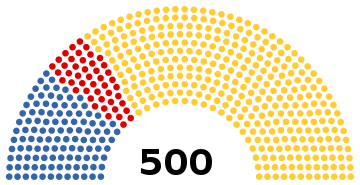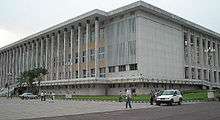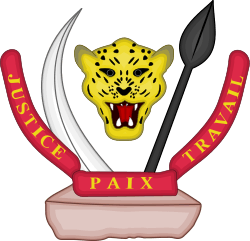National Assembly (Democratic Republic of the Congo)
The National Assembly is the lower house and main legislative political body of the Parliament of the Democratic Republic of the Congo. It was established by the 2006 constitution.[1]
National Assembly Assemblée nationale | |
|---|---|
| 3rd Legislature of the Third Republic of the Democratic Republic of the Congo | |
| Type | |
| Type | Lower House of the Parliament of the Democratic Republic of the Congo |
| History | |
| Founded | 1960 |
| Leadership | |
Jeannine Mabunda since 24 April 2019 | |
| Structure | |
 | |
Political groups |
People's Party for Peace and Democracy (PPPD): 21 seats
Social Movement (MS): 23 seats
Movement for the Liberation of Congo (MLC): 22 seats
Alliance for Renewal in Congo (ARC): 21 seats
Alliance of the Democratic Forces of Congo (AFDC): 41 seats
Alternative Action for Well-being and Change (AAB): 30 seats
Alliance of Actors for Good Governance of Congo (AABC): 22 seats
Congolese Party for Development (PCD): 11 seats
Alternative Action for Well-being and Change (AAB): 30 seats
Future of Congo (ACO): 12 seats
Alliance of Movements of Kongo (AMK): 20 seats
Alliance for Building an Emerging Congo (ABCE): 11 seats
Other parties: 35 seats
Undecided: 23 seats
|
Length of term | 5 years |
| Elections | |
Last election | 30 December 2018 |
| Meeting place | |
 | |
| Palais du Peuple Lingwala/Kinshasa | |
| Website | |
| Official website | |
 |
|---|
| This article is part of a series on the politics and government of the Democratic Republic of the Congo |
|
Government |
|
Judiciary |
|
| United Nations Mission |
|
|
It is located at the People's Palace (French: Palais du Peuple) in Kinshasa.
The most recent National Assembly was sworn in on January 28, 2019.[2][3][4]
Electoral system
The National Assembly is elected every five years by universal suffrage. For the 2018 elections the 500 seats of the assembly were apportioned among 181 electoral districts based on voter registration numbers.[5] This resulted in 62 members elected in single member constituencies by first-past-the-post and the remaining 438 members elected in multi-member constituencies by open list.[6]
Presidents of the National Assembly
Number of deputies for each constituency by province
The number of deputies elected from each subdivision in parenthesis.[7]
Bas-Uele (7)
Équateur (12)
Haut-Katanga (30)
Haut-Lomami (16)
- City of Kamina (1)
- Territories of Bukama (4), Kabongo (3), Kamina (2), Kaniama (2), Malemba-Nkulu (4)
Haut-Uele (11)
Kasaï (19)
Kasaï Central (19)
Kasaï-Oriental (14)
- City of Mbuji-Mayi (6)
- Territories of Kabeya-Kamwanga (1), Katanda (2), Lupatapata (1), Miabi (2), Tshilenge (2)
Kinshasa (55)
Kongo Central (24)
- Cities of Boma (2), Matadi (3)
- Territories of Kasangulu (2), Kimvula (1), Lukula (2), Luozi (1), Madimba (2), Mbanza-Ngungu (4), Moanda (2), Seke-Banza (1), Songololo (2), Tshela (2)
Kwango (12)
- City of Kenge (1)
- Territories of Feshi (2), Kahemba (1), Kasongo-Lunda (4), Kenge (3), Popokabaka (1)
Kwilu (29)
- Cities of Bandundu (1), Kikwit (3)
- Territories of Bagata (3), Bulungu (6), Gungu (4), Idiofa (7), Masi-Manimba (5)
Lomami (15)
- Cities of Kabinda (1), Mwene-Ditu (2)
- Territories of Kabinda (2), Kamiji (1), Lubao (2), Luilu (4), Ngandajika (3)
Lualaba (13)
Mai-Ndombe (12)
Maniema (13)
Nord-Kivu (48)
Nord-Ubangi (8)
- City of Gbadolite (1)
- Territories of Bosobolo (1), Businga (3), Mobayi-Mbongo (1), Yakoma (2)
Sankuru (14)
Sud-Kivu (32)
Sud-Ubangi (16)
Tanganyika (15)
Tshopo (16)
Tshuapa (10)
See also
- Transitional National Assembly of the Democratic Republic of the Congo
- List of Presidents of the National Assembly of the Democratic Republic of the Congo
- Members of the National Assembly of the Democratic Republic of the Congo 2006-2011
References
- United Nations Web Services Section (2007-01-27). "Address to the National Assembly of the Democratic Republic of the Congo in Kinshasa on 27 January". Un.org. Retrieved 2016-08-20.
- "After Election Upheaval, DRC Inaugurates New Parliament". Voice of America.
- "After election upheaval, DR Congo inaugurates new parliament". Daily Monitor.
- "After election upheaval, DR Congo inaugurates new Parliament". ewn.co.za.
- "Annexes a la loi portant adoption de la repartition des sieges par circonscription electorale pour les elections legislatives" (PDF). www.ceni.cd (in French). CENI. p. 3. Retrieved 10 May 2019.
- "DEC. 30, 2018 DR Congo election for Assemblée Nationale". ElectionGuide. IFES. Retrieved 13 May 2019.
- "Annexes a la loi portant adoption de la repartition des sieges par circonscription electorale pour les elections legislatives" (PDF). www.ceni.cd (in French). CENI. pp. 8–13. Retrieved 10 May 2019.